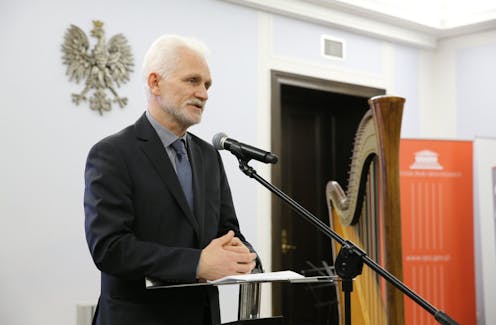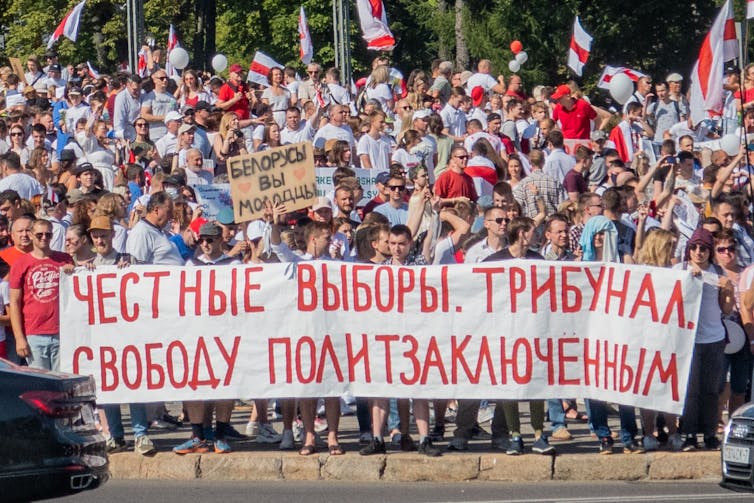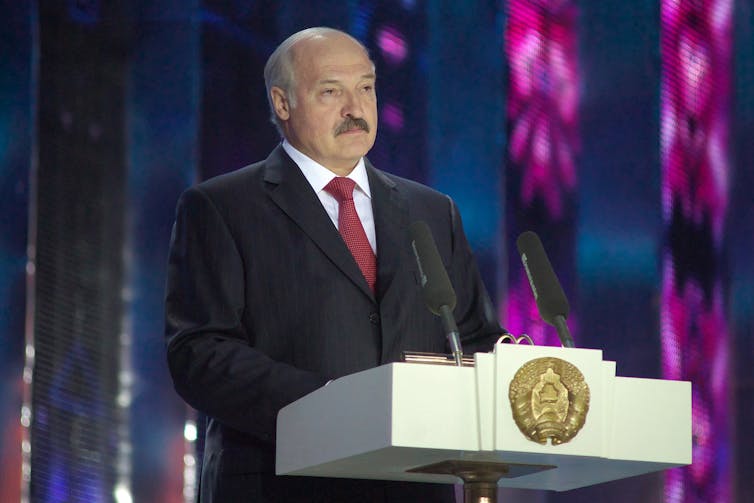
A co-laureate of the 2022 Nobel Peace Prize, the human rights activist Ales Bialiatski is the fourth person in the history of the Nobel to receive this award while in prison. With this symbolic yet powerful gesture, the Nobel committee recognised Bialiatski’s 35 years of work upholding human rights in Belarus. It also serves to remind that dozens of Belarusian human rights defenders are currently behind bars, including five of Bialiatski’s colleagues from the human rights centre Viasna (“Spring”). Dozens more have fled into exile these past months, fearing arbitrary detention or worse.
In light of the ongoing crackdown on dissent in Belarus and shrinking of civic space in Belarus, Bialiatski’s Nobel win amounts to hailing Belarusians’ long and peaceful struggle for fundamental freedoms, in a context that Russia’s war on Ukraine has significantly complicated, due to Lukashenko’s Belarus enabling role in it.
A veteran human rights activist
Ales Bialiatski was born in 1962 to Belarusian parents living in Russia at the time. Three years later they moved back to Belarus, to Svietlahorsk. At university he studied Belarusian and Russian philology, and debuted as a human rights activist by defending the right of writers and artists to use their native Belarusian language. In the 1980s he became active in pro-democracy circles that demanded more freedom of expression to honour the distinctive Belarusian culture and historic symbols, such as the white-red-white flag.
In 1987, Bialatski co-organised the first mass gathering in Soviet Byelorussia on the occasion of Dziady, a neo-pagan celebration which for Belarusian Catholics especially served to commemorate the victims of communism. Owing to its ties with the nationalist and democratic opposition, the march was dispersed and the holiday was banned altogether in 1996.
That same year, Bialiatski established the NGO “Viasna” to help victims of human rights violations and document the country’s slide into authoritarianism following the 1996 “constitutional coup”. Aleksandr Lukashenko, elected as president in 1994, expanded his powers at the expense of the Parliament, and his own term in office by two years. Following his reelection in 2001 – the legality of which was contested, while independent observers, notably from Viasna, alleged electoral fraud – the organisation’s registration was cancelled. Since 2003, Viasna has been denied registration in Belarus, where it nonetheless kept on conducting crucial human rights work.
One of Viasna’s key advocacy campaigns focuses on the abolition of the death penalty in Belarus. Bialiatski’s human rights centre has also tirelessly reminded the Belarusian authorities of their international legal obligations regarding the rights to freedom of expression, freedom of association and peaceful assembly, and the independence of the judiciary. A network of volunteers and human rights lawyers affiliated with Viasna provided support to cohorts of political opponents, journalists and street protesters routinely being arbitrarily detained in Belarus.

In Belarus as in other non-democratic countries, human rights-related activities are necessarily political. A member of the first democratically elected Minsk municipal council (1991-1996), in the late 1980s Bialiatski co-founded the Belarusian Popular Front (Belaruski Narodny Front, BNF), and later served in the party’s leadership. From the outset the BNF was an outspoken critic of communism, supported national resistance to Russification and defended a pro-democracy agenda – much to Lukashenko’s discontent, of course. Most of his political opponents had suffered regular judicial or fiscal harassment, been arrested, or even “disappeared”.
Choosing between detention and exile
In 2011, following yet another contested election, the Belarusian authorities cracked down on political opposition and civil society activists, including Bialiatski. His arrest on 4 August and subsequent sentencing to four and a half years in prison for “tax evasion” was seen by human rights defenders as politically motivated. Having been repeatedly denied registration in Belarus, Viasna had opened bank accounts in Vilnius and Warsaw, from where funds destined to support Belarusian political prisoners and their families were transferred into Belarus – “illegally”, as the authorities claimed.
Declared a prisoner of conscience by Amnesty International, Bialiatski benefited from an unprecedented international advocacy campaign led by the International Federation for Human Rights (FIDH), of which he was elected vice-president in 2007, one year after being nominated to the Nobel Peace Prize. He was eventually released on 21 June 2014, before the term of his sentence but in poor physical condition after three years of what he described as forced labour and ill-treatment in prison.
Having resumed his human rights activism, Bialiatski was well aware that he could again fall victim to repression in Belarus, especially after he lent support to the pro-democracy movement that shook Mr Lukashenka’s rule from mid-2020 onwards. Following the presidential election on 9 August, Bialiatski joined the Coordination Council established to lead the peaceful protest movement and transition after opposition candidate Sviatlana Tsikhanouskaya was forced out of the country. Soon after, most of its board members were either arrested (Maria Kalesnikava, Maksim Znak) or compelled to flee Belarus for their own safety (as did Tsikhanouskaya’s spokesperson Volha Kavalkova, former Culture Minister Pavel Latushka, and 2015 Nobel Literature Prize winner Sviatlana Alexievich).
Bialiatski refused to leave Belarus, however, feeling that his duty required that he defend his country’s battered civil society. Alongside some 35,000 protesters, hundreds of civil society activists including independent journalists were detained, fined, and in several cases faced prosecution and imprisonment for allegedly organising or financing “unauthorised mass events”, “acts of hooliganism” or “public disorder”. Marfa Rabkova, the 27-year-old coordinator of Viasna’s volunteer network, was among the first arrested, in September 2020. Charged with “calling for actions aimed at harming national security” and “creation of an extremist formation”, on 6 September 2022 she was sentenced to 15 years in prison. Human rights lawyer Leanid Sudalenka, another prominent Viasna figure, had earlier been sentenced to three years in prison.

Throughout 2021 the authorities cracked down on all civil society and human rights activists, raiding their offices and detaining the members of several NGOs and media on grounds of “extremism”, in what amounts to a witch-hunt against all those who dared to criticise the government and its policies. Dozens of lawyers defending “political” clients were disbarred, hundreds of journalists, media workers and bloggers were compelled to go underground, or face administrative or even criminal charges.
The offices of several associations and media were raided on 16 February 2021, prompting most of their workers to leave the country in the weeks that followed. In a second raid that year, on 14 July 2021, Bialiatski was detained along with Viasna’s vice-director Valiantin Stefanovich and Viasna’s lawyer Uladzimir Labkovich. They have been in pre-trial detention since then on bogus tax evasion charges. The day after Bialiatski’s 60th birthday, on 26 September 2022, even harsher charges – “smuggling” and “financing group actions that gravely violate public order” – were levelled against him and Labkovich, with a possible sentence of up to 12 years in prison.
One of the aims of the judicial harassment of Belarusian human rights defenders appears to be the complete eradication of civic space in Belarus. Across 2021-2022, more than 300 NGOs have been de-registered, banned, or compelled to “self-liquidate”. Against this backdrop, the 2022 Nobel Peace Prize rewards more than just the director of Viasna: it encourages an embattled civil society to continue fighting peacefully for the recognition and protection of the human rights of all Belarusians.
Anaïs Marin est Rapporteure spéciale de l'ONU sur la situation des droits de l'homme au Bélarus, un mandat d'expert indépendant établi par le Conseil des droits de l'homme de l'ONU qu'elle exerce à titre bénévole depuis novembre 2018.
This article was originally published on The Conversation. Read the original article.







